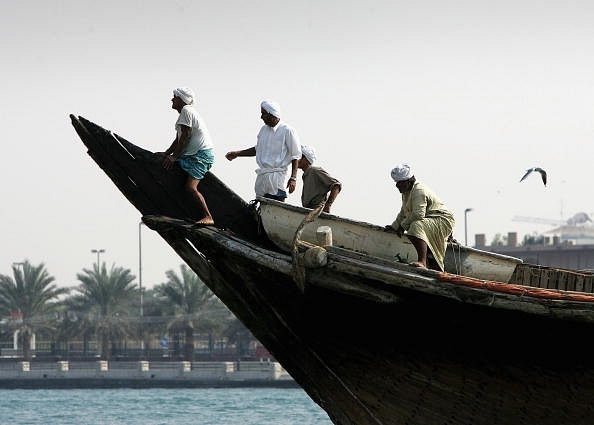Economy
No Minister, Remittances To Kerala Are No ‘Return On Social Investment’
- Kerala’s economy has been ‘saved’ by remittances from abroad. If the state’s finance minister wants to portray that as a result of thought-out, long term plan, he’s being disingenuous.

An Indian dhow crew straddles the bow of their boat December 14, 2005, in Dubai, United Arab Emirates. (Chris Jackson/Getty Images)
Kerala’s Finance Minister Dr Thomas Isaac, apparently responding to the author’s November 2017 article on Kerala’s dependence on Gulf remittances, has tweeted that the remittances ‘were a return on social investment’ that the state had made.
Dr Isaac’s claim is that Kerala’s reliance on the Gulf is a durable long-term economic model. That is plainly false.
There are threats looming over Kerala’s Gulf dream. Starting with the 2008 global recession that led to around 50,000 emigrants losing their jobs and returning home, to the recent political crises in the region as well as drive to ‘nationalise’ jobs, could lead to an increasing number of emigrants returning to the state.
The ever growing Kerala welfare state has already started offering sops to non-resident Indians (NRIs), allocating an amount of Rs 80 crore for welfare and related schemes, even as the state continues to face a financial crisis, which has not been addressed by the high expenditure 2019-19 Budget.
Dr Isaac also implies that the migration of Malayalees to the Gulf is a planned exercise, but it is not as the emigrants are being forced to move out of Kerala because of the lack of job opportunities in the state. Even today, the unemployment in the state is higher than the national average, the state’s Public Sector Units are making stupendous losses as usual and the state is ranked the lowest in ease of doing business ranking. This was the same economic environment in the 1980s and 1990s that served as the ‘push’ for migrants to move out in the first place. If there were enough employment or entrepreneurial opportunities available in the state, why would skilled and semiskilled migrants migrate en masse? There are around 24 lakh Malayalees working abroad as of 2014. Many of them are much more highly educated and younger than the mean population of Kerala.
This has been the situation in the state for a long time. In 1988, the state accounted for 10 per cent of all job seekers in the country when its share of population was 3.7 per cent (Kerala Economic Survey, 1988). Of the 108 lakh labour force in the state at the time, around 25 per cent (27.81 lakh) of them were unemployed, and another 14 per cent (15.28 lakh) of them underemployed. These statistics paint a rough picture of how dire the situation was at that time. The migration to the Gulf had only started to pick up at that point, with estimated migrants ranging from 3 to 5 lakh.
In 1998, 37.53 lakh were unemployed, with around 76 per cent of them having passed SSLC or above. At the same time, around 16 lakh Keralites were working in the Gulf countries.
A clear picture can be drawn about how the state’s economy has been ‘saved’ by the Gulf boom in this manner. It is therefore disingenuous to say that the remittances that the state receives are from some long-term, well thought out plan that was executed systematically. Rather, it was a marriage of convenience that has benefitted both parties in the short term.
It seems however, as indicated from Dr Isaac’s tweets that the Kerala government has not recognised the problem of overt dependency on overseas remittances. If Kerala wants to attract investment, it has to create employment opportunities and develop its economy for which significant reforms are needed. Improving the ease of doing business in the state could be the good first step in that direction. Political hounding and extortion-like activities that recently led a non-resident Keralite entrepreneur to commit suicide should end. So also the political enablement of trade union hooliganism. Without these changes, Kerala will increasingly depend on more emigration, and be ready to face economic instability in the future.
Support Swarajya's 50 Ground Reports Project & Sponsor A Story
Every general election Swarajya does a 50 ground reports project.
Aimed only at serious readers and those who appreciate the nuances of political undercurrents, the project provides a sense of India's electoral landscape. As you know, these reports are produced after considerable investment of travel, time and effort on the ground.
This time too we've kicked off the project in style and have covered over 30 constituencies already. If you're someone who appreciates such work and have enjoyed our coverage please consider sponsoring a ground report for just Rs 2999 to Rs 19,999 - it goes a long way in helping us produce more quality reportage.
You can also back this project by becoming a subscriber for as little as Rs 999 - so do click on this links and choose a plan that suits you and back us.
Click below to contribute.
Latest